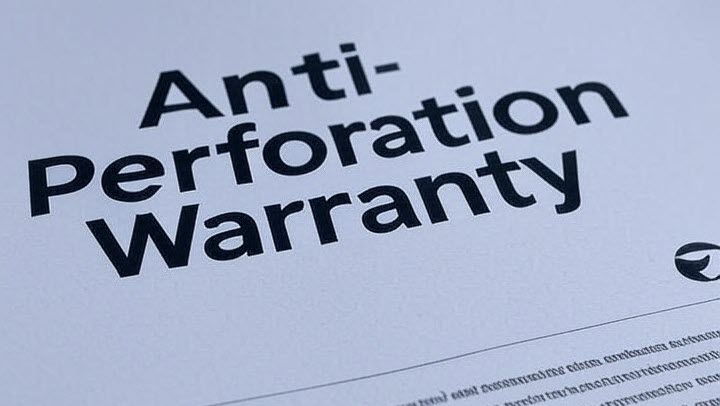What Is an Anti-Perforation Warranty? What You Should Know
When buying a new or used car, you may come across the term anti-perforation warranty in the paperwork or owner’s manual. But what exactly does this warranty cover, and how is it different from standard corrosion or paint warranties? In this guide, we explain what an anti-perforation warranty is, what it includes and excludes, how long it lasts, and how to ensure you stay protected.
What Is an Anti-Perforation Warranty?
An anti-perforation warranty (also known as a rust-through warranty) is a manufacturer’s guarantee that protects against rust that starts underneath the vehicle’s surface and leads to a hole in the metal.
This warranty typically covers corrosion that begins inside a sealed panel and progresses outward, perforating the metal from the inside out.
How Is It Different from a Corrosion Warranty?
It’s important to distinguish between two different types of rust protection:
| Warranty Type | Covers | Typical Duration |
|---|---|---|
| Corrosion Warranty | Surface rust, bubbling paint | 3–5 years |
| Anti-Perforation Warranty | Rust that causes a hole from internal corrosion | 6–12 years |
Surface corrosion, often caused by paint damage, is not covered under anti-perforation policies unless it results in a full perforation.
What Does an Anti-Perforation Warranty Cover?
- Rust that originates under the surface of the metal
- Perforation (holes) caused by corrosion inside the body panels
- Factory-installed metal components such as doors, bonnet, tailgate, and underbody panels
For example, if a rust spot starts inside a sealed door panel and eventually creates a hole visible from the outside, it would likely be covered under this warranty.
What Is Not Covered?
Anti-perforation warranties do not typically cover:
- Surface rust caused by scratches, chips, or road debris
- Rust from accident damage or improper repairs
- Corrosion caused by modifications or aftermarket parts
- Rust from poor vehicle maintenance, such as neglecting to wash salt from winter roads
- External rust that does not lead to perforation
Always read the terms and conditions in your warranty booklet for specifics.
How Long Does It Last?
Anti-perforation warranties typically last between 6 and 12 years, depending on the manufacturer:
- Volkswagen: 12 years
- BMW: 12 years
- Ford: 12 years (most models)
- Toyota: 12 years
- Vauxhall: 6–12 years depending on the model
In most cases, the warranty is transferable to subsequent owners, adding value if you sell your car.
How to Maintain Your Anti-Perforation Warranty
To keep your warranty valid, follow these steps:
- Adhere to service intervals and scheduled inspections
- Wash the car regularly, especially in winter months
- Keep the underbody clean to prevent salt build-up
- Fix chips and scratches before rust can develop
- Maintain a record of any required corrosion inspections, as some manufacturers ask for annual checks
Failure to follow the manufacturer’s maintenance guidelines could void your warranty.
How to Make a Claim
If you discover rust that appears to be forming from the inside out:
- Visit an authorised dealership or service centre
- Request a rust inspection
- Provide service records and proof of maintenance
- If approved, the repair will usually be free of charge, including materials and labour
The dealer may take photos and submit them to the manufacturer before proceeding.
Is It Worth It?
Yes. Rust perforation can compromise structural safety and significantly reduce resale value. Having coverage in place can:
- Save you hundreds or even thousands in body repair costs
- Improve resale value by offering a transferable warranty
- Give you long-term peace of mind, especially in countries with harsh winters or high humidity
Conclusion
An anti-perforation warranty is a long-term manufacturer warranty that protects your vehicle from rust that develops from the inside of metal panels and leads to holes. It is different from surface rust protection and often lasts up to 12 years.
To stay covered, maintain your vehicle according to the manufacturer’s guidelines, get regular inspections, and act quickly if signs of internal corrosion appear. This simple protection can save you from major repair costs down the line.
Buying a used VW. Buying used vauxhall, BMW, Jaguar, Ford, Volvo, Range rover, Bentley, Aston Martin, Porsche, Ferrari, Lamborghini, Maserati, Hyundai, Tesla, Honda, Pagani

